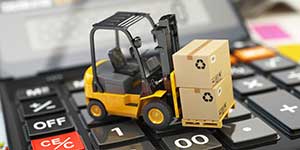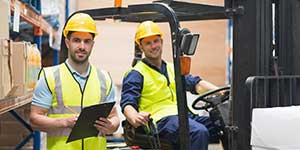Industry Regulations and Standards for Lift Truck Training & Mobile Elevated Work Platform (MEWP) Training
One of the biggest challenges in our industry is awareness surrounding the importance of safety training regulations and standards. Taking lift truck training to become a trained operator is not something that can be accomplished in a short familiarization session. To become fully qualified, you are required to receive a certification from a qualified trainer. This can be completed either in a classroom or through online mediums, but in-depth hands-on training with the equipment is required.
Here are some common questions that are asked regarding the requirements for lift truck training and mobile elevated work platform (MEWP) training:
Training Regulations - General Questions

Do I need to take training classes to operate powered equipment?
Yes, training for powered equipment is mandated by industry standards. A valid certificate is required for anyone who operates any kind of equipment. Supervisors and managers are also encouraged to take the class even if they do not personally operate the equipment. The reason for this is because it is their responsibility to ensure the health and safety of their team, and what better way to do that than to be a fully certified equipment operator!
What training is required to receive certification?
An operator training class is typically split into two sections, with both sections having an assessment or exam portion at the end.
The first section of the training course is theory training. This can be completed either in-person or online. The theory portion will cover topics such as the inspection of equipment and the workplace, the operation of the equipment, and the maintenance of the equipment.
The second section of the training course is the practical experience portion, in which the trainee will receive hands-on training with the equipment. This hands-on experience will last as long as sufficient for the trainee to gain adequate experience with the machine.
A qualified trainer will provide an assessment of the trainee regarding the proper handling and operation of the equipment. During the assessment, trainees will be required to answer questions that will ensure they have the knowledge needed to safely operate and inspect the equipment.
For more details about the training requirements on specific equipment, please refer to either the Lift Truck or Mobile Elevated Work Platforms (MEWP) section below.
How long is a training class?
Your typical training class takes one full 8-hour day per piece of equipment. This 8-hour day will be split into 4 hours of theory training and 4 hours of hands-on training.
Can I take only the written exam to receive operator certification? Unfortunately, a written exam is not enough to meet the industry standards to receive an operator’s certificate. The hands-on portion of the training class is what proves to your qualified trainer that you can operate the equipment safely. To receive your certification, an operator is required to pass both the theory and the hands-on training portions.
How long does the training certification last?
Your operator’s certificate will last 3 years. After the 3 years your certificate will be considered expired. To recertify you will need to complete the full theory and assessment portions for the equipment you had originally completed the training for.
How often do I need to be retrained?
It is important to have your performance on your equipment evaluated on a regular basis. The reason for this is to ensure that you are still proficient and are able to safely operate your equipment. Please read below for a few examples of certain situations where you might need to be retrained:
- Your operator certificate has expired
- Your performance on the equipment has deteriorated
- You have not operated the equipment for an extended period
- You have been introduced to a new or different type of equipment
- You were involved in an accident or near-miss with the equipment
Who sets the standards in the industry?
Industry standards are developed by ANSI in the United States. These standards help to define all safety requirements for those who are involved in the industry. It is important to note that standards are voluntary and not mandated by law. Even though they are not mandatory, they are still viewed as very important and are widely accepted and used by manufacturers, owners, and operators alike. Governing bodies, such as OSHA, can adopt and incorporate these standards into regulations, which would then make them a requirement by law.
What is ANSI?
ANSI stands for the American National Standards Institute. This organization is a private and not-for-profit. ANSI’s main purpose is to provide concise industry standards that set a high level of quality and safety for all members involved. They also set standards regarding assessment systems that are used for operator training courses.
What is OSHA?
OSHA stands for the Occupational Safety and Health Administration. This organization is a government agency that creates and enforces the standards we use to ensure employees are provided with safe working conditions. OSHA regulations are law and OSHA regulators are able to issue fines if standards and requirements are not met.
Training Regulations - MEWP Questions

Are there new or updated standards for MEWP?
Yes, there are new standards for MEWP equipment. The ANSI A92 standard that covers MEWPs was updated during December 2019. Multiple updates were made regarding the classification of MEWPs and the various training requirements that teach how to safely operate the equipment.
Why did the ANSI standards change?
ANSI has had its own set of standards valid in the United States for about 15 years. Making the updates to the ANSI A92 aligns their information more closely with other governing bodies throughout the world. This new update also addresses newfound issues, provides a simpler understanding of MEWP classification and their respective terminology, as well as promotes better safety practices and education.
What has changed in the new ANSI standards?
Three areas are covered with the new changes to the ANSI standards: design, safe use, and training. Terminology was changed throughout regarding the equipment. Mobile Elevated Work Platforms, or MEWPs, is replacing the previous term Aerial Work Platforms, or AWPs. MEWPs will also be classified differently. They will be divided into two groups and three types based on various equipment features like the tipping line and the method of travel.
Regarding equipment design standards, MEWPs are required to continuously check the weight within the platform. They are required to disable functions of the equipment if the load is greater than the platform limit. There has also been an allowance for the development of small, light-weight MEWPs that are meant to be used indoors only.
MEWP owners will be responsible for all training on the equipment and using the equipment safely. Dealers or renters of MEWPs will be required to update all training procedures and manuals. They will also be required to retrain their employees on the new standards. It is also required by the new standards that all supervisors of MEWP operators be trained on the equipment.
Who must be trained on the new standards? Anyone who is currently trained must be retrained to the new standards. They must also have proof that they have updated their training to meet the new standards. All trainers must update their current training to the newest standards. Finally, anyone who directly supervises a MEWP operator must also take the proper training with the updated standards.
What is required for my MEWP training to be compliant with ANSI/OSHA?
In order to meet the standards outlined by ANSI and OSHA and receive certification, the operator must be trained in, but not limited to, the following:
- How to properly select the correct MEWP for the work to be performed
- How to properly perform a workplace Risk Assessment, including Rescue Planning
- How to provide instructions to occupants
- MEWP maintenance, inspections, and required repairs
- How to prevent unauthorized use of the MEWP
- How to use personal protective equipment, including Fall Protection, that is appropriate to the task, worksite, and environment
- The operator is also required to demonstrate their proficiency in the operation of the MEWP.
Training Regulations - Lift Truck Questions

What is required for my Lift Truck training to be compliant with ANSI/OSHA?
In order to meet the standards outlined by ANSI and OSHA and to receive proper certification, the operator must be trained in, but not limited to, the following:
- The fundamentals of powered lift trucks
- How lift truck performance can be affected by environmental conditions
- Basic lift truck operating skills
- A good understanding of the rules and practices for safe lift truck operation
- Practice sessions under the supervision of a qualified trainer on load handling, maneuvering, travelling, stopping, and starting.
The operator is also required to demonstrate their proficiency in the operation of the lift truck.
Do I need to be trained on each make and model of lift truck?
No, it is not necessary to be trained on every make and model of lift truck. However, it is necessary to be trained on the different types of forklifts if you will be operating more than one, such as a sit-down rider truck versus a stand-up truck, or an order-picker versus a pallet jack. If you have been trained on one specific type of lift truck, you do not need to be retrained to operate the same type of lift truck made by a different manufacturer. However, you may need to be instructed on any differences between the two brands such as truck controls.




